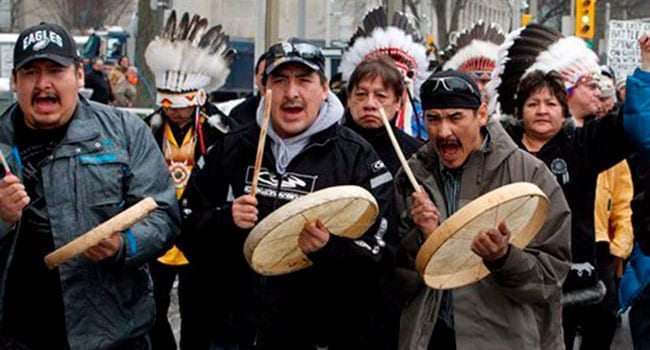 Over the past two weeks, my wife and I have twice encountered Wet’suwet’en protesters in the B.C. Lower Mainland. I wondered what the hell was being accomplished if people like me were getting angry?
Over the past two weeks, my wife and I have twice encountered Wet’suwet’en protesters in the B.C. Lower Mainland. I wondered what the hell was being accomplished if people like me were getting angry?
The first encounter saw us turned away from the 9 a.m. ferry from Tsawwassen to Swartz Bay – we had important meetings in Victoria. We were forced to reroute via the Duke Point ferry, Nanaimo and the winter conditions of Malahat Drive to get to Victoria six hours late.
The second blockage held us up on 12th Avenue in front of the Vancouver General Hospital for an hour as protesters blocked off a major intersection. We especially noted the impact of that protest on ambulances and their human cargoes heading into the hospital’s emergency ward. They were forced the wrong way down streets and slowed to a stop by seized-up traffic.
All of this piqued my emotions.
People like me refers to the 40-year career I’ve had working with Metis, First Nation, Inuit and Sami communities in Canada and Russia. I’m well aware of Indigenous property rights on non-treaty lands and the rule of law of Delgamuukw versus British Columbia, a 1997 Supreme Court of Canada that helped define the notion of Aboriginal title.
I’ve spent several hours in the past week discussing the proposed Kitimat liquefied natural gas (LNG) plant and Coastal GasLink pipeline project that’s the cause of the protests. I’ve talked with experts with whom I’ve shared decades of friendship and travail in the cause of fair and culturally acceptable economic development.
Two viewpoints emerged from these discussions: one centres on the concept of tipping point – that we’ve reached a point in Canada, from coast to coast to coast and especially (but not only) in Indigenous communities, where enough is enough in terms of running roughshod over Aboriginal title, and the powers of hereditary chiefs whose mission is to steward lands, waters and wildlife populations for those yet unborn.
The alliance of primarily non-Indigenous groups like Extinction Rebellion with the hereditary Wet’suwet’en chiefs also reflects the tipping point in our broader society. The climate crisis has reached the point where there is basically a decade left to begin significantly decarbonizing society if we wish to avoid a major cataclysm, which is increasingly likely by 2150 and certainly by 2100.
ShutDownCanada claims are spurious and harmful by Tom Flanagan
The duties of Aboriginal title and the general public awareness of climate science have combined to create a sense that enough is enough. The protests across Canada are rooted in this synthesis and understanding.
At the same time, we must face the reality that the band councils of 20 First Nations have signed on to the concept of the LNG plant and associated pipeline benefits agreements. They need to have serious discussions with the Wet’suwet’en hereditary leadership about the democratic and culturally appropriate resolutions to this crisis.
The actual owners of the pipeline right-of-way and the LNG plant site, and the associated tidal water exits to international offshore waters, must deliberate and determine for the rest of us what will work at the community level for them. And we all must be prepared to accept their resolutions of this multi-faceted dilemma.
I’m aware as a student of anthropology that for at least 30,000 years what we today know as North America was sustainably stewarded by the First Peoples. The climate crisis is the product of an industrial revolution begun in the early 1700s and imported to North America by European capitalists who sought to create more capital at the expense of whatever got in the way.
I stand with the Wet’suwet’en people by Gerry Chidiac
Paradoxically, as we grapple with the results of their unfettered labours, as stock indices grow from peak to new peak, we also ponder the end of the capitalist system’s infatuation with combusting carbon to create energy.
Hand in hand with this reality, we see ever-growing crowds of millennials link arms in protest at intersections and along rail lines in many parts of the country.
As much as I’m angered by the short-term inconvenience this creates, I know that what follows if we don’t quickly change our ways is anathema.
Mike Robinson has been CEO of three Canadian NGOs: the Arctic Institute of North America, the Glenbow Museum and the Bill Reid Gallery. Mike has chaired the national boards of Friends of the Earth, the David Suzuki Foundation, and the Canadian Parks and Wilderness Society. In 2004, he became a Member of the Order of Canada.
The views, opinions and positions expressed by columnists and contributors are the author’s alone. They do not inherently or expressly reflect the views, opinions and/or positions of our publication.
